Exploring Deepwater World War II Battlefields in the Pacific Using Emerging Technologies
Exploration Team
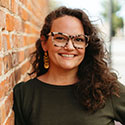
Jennifer McKinnon
Principal Investigator; Research Associate, Ships of Discovery/Professor, Department of History, East Carolina University
Jennifer (Jen) McKinnon, Ph.D., is a research associate with Ships of Discovery and a professor with East Carolina University’s Department of History, Program in Maritime Studies. She has worked in the United States, Australia, the Pacific, and Europe on sites ranging from the colonial period to World War II (WWII). Jen has researched and written extensively on heritage and conflict sites in the Pacific, spending over a decade working on sites in Saipan. She has published several journal articles and book chapters and co-edited (with Toni L. Carrell) a book entitled Underwater Archaeology of a Pacific Battlefield: The WWII Battle of Saipan. In 2011, she was awarded the Governor’s Humanities Award for Preservation of CNMI History for the development of the WWII Maritime Heritage Trail — Battle of Saipan. She has served as an expert for the United Nations Educational, Scientific, and Cultural Organization (UNESCO) in the Pacific, writing and contributing to two UNESCO publications on maritime heritage and WWII heritage in the Pacific.
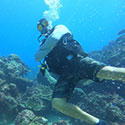
David Benavente
Co-Principal Investigator; Marine Biologist and Project Manager, Mariana Islands Nature Alliance
David (Dave) Benavente’s upbringing as a farmer and fisherman on Saipan, in the Commonwealth of the Northern Mariana Islands (CNMI), cultivated his interests for island ecosystems, which ultimately led him to obtain a master’s degree in marine biology (University of Guam Marine Lab, 2014). For over a decade, he worked in the CNMI as a biologist at the Bureau of Environmental and Coastal Quality, studying and analyzing coral reef trends of the CNMI and greater Micronesia region. His freelance work as a marine research consultant has allowed him to study some of the most pristine reefs in the Pacific and build capacity among fellow islanders to better understand its resources. His current position as a marine biologist and project manager at a local nonprofit organization affords him the opportunity to remain in the field and use his technical knowledge to address key environmental issues that island communities face. In addition to his personal business and work with nonprofits, Dave is also a part-time adjunct instructor of marine biology at the Northern Marianas College, where he provides mentoring for students in the hopes of fostering a greater interest in environmental sustainability and STEM (science, technology, engineering, and math) fields.
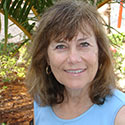
Toni Carrell
Co-Principal Investigator; Vice President, Ships of Discovery
Toni Carrell, Ph.D., is the vice president of Ships of Discovery. She received her doctoral degree in maritime history from the University of St. Andrews, Scotland. She has worked in the United States, Caribbean, and the Pacific on sites ranging from early man to World War II (WWII). Toni is the editor of Submerged Cultural Resources Assessment of Micronesia (1991), Maritime History and Archaeology of the Commonwealth of the Northern Mariana Islands (2009), and as co-editor (with Jennifer McKinnon) of Underwater Archaeology of a Pacific Battlefield (2015). Toni has returned to her early research into WWII in the Pacific and has participated in numerous research expeditions in the region since 2009. Her research interests include ship design and construction, cultural resources management, conflict archaeology, and historical and maritime archeology. Toni is excited to return to Saipan for this multidisciplinary scientific and community-focused expedition.
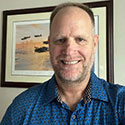
Geoffrey Anthony
Graduate Student, Maritime Studies Program, East Carolina University
Geoffrey (Geoff) Anthony is a retired Marine Corps colonel, having recently completed a 28-year career spanning the globe. He is new to the archaeological field, and is in his first year of the East Carolina University’s master’s program in maritime studies. As an avid student of military history, he is leveraging the intersection between World War II operations in the Pacific and their archaeological legacy. Geoff is currently focused primarily upon seaplane activities in the Roadstead Seadrome, established by necessity four miles from the Saipan beachheads, and the undiscovered remains of a sunken Martine PBM-3D Mariner patrol plane located there. He graduated from Texas A&M University, has earned master’s degrees in international relations, national security studies, and military studies, and has served as a commandant’s fellow to the Center for Strategic and International Studies.
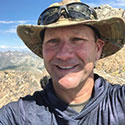
Brigadier General Gentry W. Boswell
Team Lead, Task Force Dagger Special Operations Foundation
Brigadier General Gentry W. Boswell is a career military officer who served over 30 years in U.S. Air Force and Joint Operational Combat Units. He commanded two combat wings and served as the deputy commander for the Department of Defense’s only Joint Region Command in the Pacific area of responsibility. He amassed over 4,800 hours of flight time in the B-1B, B-52H, RC-135, and E-6B, with over 500 hours of combat time in Southwest Asia, the Horn of Africa, and the Balkans. He served as the director of operations for Air Force Global Strike Command and has two Pentagon tours serving in the Operations and Organization Directorates leading over $52 billion dollars of budget execution responsibility for cutting-edge operations and developmental programs for the Air Force and Department of Defense. Gentry received his commission in 1991 as a distinguished graduate of the Air Force Reserve Officer Training Corps at Delta State University, Mississippi, and earned master’s degrees in aerospace science, political science, and strategic planning. He serves on the Task Force Dagger Special Operations Foundation Board (TFD) and will be the team lead for TFD for this expedition.
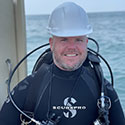
Ryan Bradley
Dive Safety Officer, East Carolina University
Ryan Bradley is the dive safety officer for East Carolina University (ECU). He is an American Academy of Underwater Sciences (AAUS) scientific dive instructor with a master’s degree in maritime studies from ECU. Prior to working for ECU, he served as a maritime archaeologist, an education and outreach specialist, and an underwater operations specialist. He is responsible for training ECU’s maritime studies students in AAUS scientific diving, Diver Alert Network’s first aid, and CPR, as well as ensuring diving safety protocols are followed during field projects.
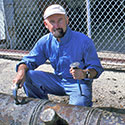
Jon Carpenter
Maritime Archaeological Conservator, Western Australian Museum
Jon Carpenter is a maritime archaeological conservator at the Western Australian Museum. His position involves diving to conduct pre-disturbance surveys of shipwreck sites and to provide conservation support for maritime archaeological excavations. His laboratory work is principally with iron objects recovered from shipwrecks. Jon has conserved cannons and anchors from several wrecks, including a cannon from Australia’s earliest known shipwreck, Trial (1622); carried out remedial conservation work on cannon from HMB Endeavour (1770) and conserved carronades from HMS Sirius (1790), the principal escort of the first fleet arriving in Australia (1788).
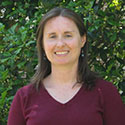
Erin Field
Associate Professor, Department of Biology, East Carolina University
Erin Field, Ph.D., is a microbial ecologist with expertise in biocorrosion, water treatment, and environmental DNA (eDNA) in aquatic environments. She received her bachelor’s degree in environmental science from Southampton College and her doctoral degree in microbiology from Montana State University. Erin has used eDNA to monitor microbial communities associated with metal structures as well as in conservation efforts of organisms such as river herring in North Carolina. She is excited to apply eDNA techniques on this expedition to assess the environmental health and biodiversity of World War II maritime heritage sites in the Pacific.

Nicole Grinnan
Research Associate and Public Archaeologist, Florida Public Archaeology Network
Nicole Grinnan is a research associate and public archaeologist with the Florida Public Archaeology Network, a program of the University of West Florida. She is currently working on a doctoral degree at the University of St Andrews (in the United Kingdom) that seeks to understand how coastal communities place value on local cultural heritage and how community input can help prioritize heritage research, management, and mitigation. Much of Nicole’s work has focused on bringing attention to underwater archaeology and highlighting the importance of underwater historic preservation in Florida and across the world. Her efforts have included leading public engagement programs, facilitating community science trainings, and developing digital media initiatives for divers and nondivers alike. Nicole is also a registered professional archaeologist, a certified interpretive guide through the National Association for Interpretation, an SDI scuba instructor, and a TDI technical diver. She currently serves as membership chair for the American Academy of Underwater Sciences and as webmaster for the Society for Historical Archaeology.
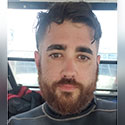
Brett Hood
Graduate Student, Maritime Studies Program, East Carolina University
Brett Hood graduated from East Carolina University (ECU) with a bachelor’s degree in anthropology and certification in cultural resource management. Brett’s interest in cultural resource management was sparked after a field school with Charles Ewen and his work to restore the abandoned African American cemetery in Ayden, North Carolina, to the community. He is currently finishing his first year of the master’s program in maritime studies at ECU. Brett is studying the land and seascapes of World War II memorialization focusing on underwater memorials and the cultural, social, and political motivations behind these sites. He is also looking at how memorialization has been managed in the past and what regulations and controls exist in the present. Brett will be developing a storymap that he hopes will benefit the community of Saipan and that can be shared with the public and future generations. He is a National Association of Underwater Instructors divemaster, American Academy of Underwater Sciences scientific diver, and Scuba Diving International ice diver.
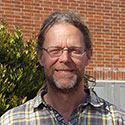
Mark Keusenkothen
Director of Diving and Water Safety, East Carolina University
Mark Keusenkothen is the director of diving and water safety at East Carolina University (ECU). He earned his bachelor’s degree in biology from Missouri State University in 1995 and his master’s degree in biology from ECU in 2002. His responsibilities at ECU include managing the Scientific Diving Program and overseeing the research vessel fleet, as well as supervising diving operations on field projects. Additionally, he is a graduate student in the ECU program in maritime studies. His research focus is the geomorphological effects of warfare on coral reefs.
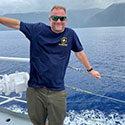
Jason T. Raupp
Assistant Professor of Maritime Studies, East Carolina University/Research Associate, Department of Archaeology, at Flinders University (Australia)
Jason Raupp, Ph.D., is an assistant professor of maritime studies at East Carolina University and a research associate in the Department of Archaeology at Flinders University (Australia). Specializing in maritime archaeology and maritime history, he holds a bachelor’s degree in anthropology from Northwestern State University, a master’s degree in history from the University of West Florida, and a doctoral degree in archaeology from Flinders University. Over the past twenty years, he has been involved with maritime and terrestrial archaeological research in the United States, Africa, Australia, Asia, Europe, the Caribbean, and the Pacific region. His research interests include historical and maritime archaeology of the Pacific Ocean, Latin America, and the Caribbean; culture contact; historic fisheries; military technologies; battlefield studies; and contact-period rock art. He has authored or co-authored chapters in books, papers in conference proceedings, book reviews, and professional reports, as well as numerous articles that have appeared in peer-reviewed journals, including the Journal of Maritime Archaeology, the International Journal of Nautical Archaeology, the Bulletin of the Australasian Institute for Maritime Archaeology, and Florida Historical Quarterly.

Vicki Richards
Manager of the Department of Materials Conservation, Western Australian Museum
Vicki Richards is the manager of the Department of Materials Conservation at the Western Australian Museum. She is also a qualified research chemist and has been conducting research on the preservation of maritime heritage for over 30 years. Her research activities are quite varied. Establishing the extent of degradation of shipwrecks by performing extensive on-site conservation surveys is one of her primary areas of interest. Based on her research, she devises and implements appropriate on-site management strategies for the long-term in situ preservation of these sites and their associated artifacts.
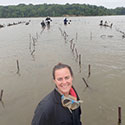
Allyson Ropp
Doctoral Student, Integrated Coastal Sciences Program, East Carolina University/ Historic Preservation Archaeological Specialist, North Carolina Office of State Archaeology
Allyson Ropp is a doctoral candidate in the Integrated Coastal Sciences Program at East Carolina University and the historic preservation archaeological specialist for the North Carolina Office of State Archaeology. While her current research focuses on heritage at risk in coastal and marine environments, Allyson’s past research explored the maritime cultural landscape of piracy in colonial North Carolina, the shipwrecks of Lake Champlain, the maritime history of St. Augustine, Florida, and the shipwrecks of the Outer Banks. She has worked around the world, including Vermont, Florida, Costa Rica, Saipan, Italy, and the Marshall Islands. Today, she is focused on exploring the natural and cultural threats to the stability of sites across coastal North Carolina and in the Mallows Bay-Potomac River National Marine Sanctuary.
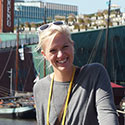
Madeline Roth
Maritime Archaeologist, NOAA Office of National Marine Sanctuaries
Madeline Roth is a maritime archaeologist with the NOAA Office of National Marine Sanctuaries’ Maritime Heritage Program. She received her bachelor’s degree in anthropology from St. Mary’s College of Maryland and holds a master’s degree in maritime studies from East Carolina University. Over the past decade, Madeline has been involved in archaeological projects throughout the United States, Caribbean, Africa, and Pacific. At NOAA, she is primarily responsible for heritage resource management and field operations. Her research interests include naval battlescapes, conflict archaeology, and heritage policy. She is looking forward to returning to the Pacific for its incredible communities, archaeology, and of course, sushi.
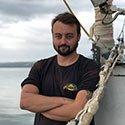
Daniel Schaefer
Graduate Student, Maritime Studies Program, East Carolina University
Daniel (D.J.) Schaefer is originally from Waukesha, Wisconsin. From 2012-2017, he served as an infantryman and reconnaissance scout in the U.S. Army with the 101st Airborne Division. Upon leaving the military, he lived in Israel for two years, studying and working as a fisherman on the Galilee Sea. After that, returned to the United States to finish his undergraduate degree at the University of Wisconsin-Madison. During this time, he began his work as a researcher with the University of Wisconsin Missing in Action Recovery and Identification Project. The project works to recover, identify, and repatriate missing in action (MIA) U.S. service members by conducting annual field excavations and year-round research assistance to families of missing service members. In May 2021, he received a bachelor’s degree in history with minors in classics and European studies. D.J. is currently attending graduate school at East Carolina University in maritime studies for his research interests in World War II and his continued efforts in MIA recovery. His thesis focuses on the effectiveness of Japanese radar during the Battle for Saipan and the related submerged U.S. aircraft wrecks.
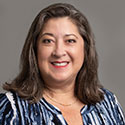
Della Scott-Ireton
Interim Associate Dean of the College of Arts, Social Sciences, and Humanities, University of West Florida
Della Scott-Ireton, Ph.D., has a bachelor’s degree in anthropology and a master’s degree in historical archaeology University of West Florida. She also has a master’s degree in international relations from Troy University, and a doctoral degree in anthropology from Florida State University. Della is certified as a scuba instructor with the National Association of Underwater Instructors. She worked with the Pensacola Shipwreck Survey, West Florida Historic Preservation, Inc., Florida Bureau of Archaeological Research, and the government of the Cayman Islands before joining the Florida Public Archaeology Network. Della is the interim associate dean of the College of Arts, Social Sciences, and Humanities at the University of West Florida. Della is a registered professional archaeologist and member of the Florida Archaeological Council and has served on the board of the Society for Historical Archaeology, the Advisory Council on Underwater Archaeology, and the Marine Protected Areas Federal Advisory Committee. Her research interests include public interpretation of maritime heritage and training and engaging "citizen scientists" in archaeological methods and practices. She is the author of "Maritime Historic Site Management for the Public" in the Encyclopedia of Global Archaeology (Springer, 2014) and is editor/co-editor of several publications focused on public interpretation and management of submerged heritage sites. Della is the recipient of the 2015 Florida Department of State Senator Bob Williams Award for Public Service in Historic Preservation in Florida.
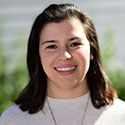
Maggie Shostak
Doctoral Student, Department of Biology, East Carolina University
Maggie Shostak is a first year doctoral student in the Department of Biology at East Carolina University. Her research interests include studying the role microbes play in microbial influenced corrosion (MIC) of steel-comprised shipwrecks. Her research involves environmental DNA (eDNA) sequencing to determine the relative abundance and diversity of the microbes in these environments. As a member of this expedition, she is very excited to collect more eDNA samples from the various World War II wrecks in Saipan. She hopes to determine the effect that MIC has on aluminum-comprised structures and how it affects the surrounding environment.

Aleck Tan
GIS Specialist
Aleck Tan is a maritime archaeologist specializing in geographic information systems (GIS) data collection, management, processing, and visualization. Aleck holds a bachelor’s degree in anthropology from California State Polytechnic University, Humboldt, and a master’s degree in maritime studies from East Carolina University. Her master’s thesis focused on analyzing cultural impacts of post-wrecking activities on two Manila galleon shipwrecks in the Northern Mariana Islands. She has participated in terrestrial and maritime archaeological projects in Saipan, Costa Rica, Belize, North Carolina, and California, and has produced maps for projects all over the southeast and west coasts of the United States. One of her main goals is to promote diversity, equity, and inclusion in maritime archaeology.
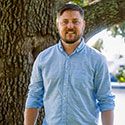
Mike Thomin
Manager, Destination Archaeology Resource Center, Florida Public Archaeology Network/Faculty Research Associate, University of West Florida
Mike Thomin is the manager of the Florida Public Archaeology Network’s Destination Archaeology Resource Center in Pensacola, Florida. Additionally, he is a faculty research associate at the University of West Florida. Mike holds a master’s degree in history/public history and has spent the past 16 years working as a museum professional in the field of public archaeology. He has worked on a variety of heritage interpretative and cultural tourism projects with local, state, federal, and international agencies. He is the co-founder and treasurer of the Northwest Florida Maritime Landscape Alliance for Preservation, Inc. Mike has a passion for maritime history and is an American Academy of Underwater Sciences scientific diver. His research interests and publications include a wide range of subjects, including public history, maritime history, maritime archaeology, public archaeology, museum studies, and heritage interpretation.
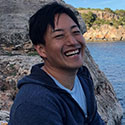
Kotaro Yamafune
President, A.P.P.A.R.A.T.U.S. LLC
Kotaro Yamafune received his bachelor’s degree in history from Hosei University in Tokyo in 2006. He entered the Nautical Archaeology Program in the Anthropology Department at Texas A&M University in September 2009 and received his master’s degree in August 2012. He continued his studies in Texas A&M’s Nautical Archaeology Program and earned his doctorate in May 2016. His research interests include shipbuilding in medieval Europe and the European Age of Discovery and ship reconstruction, both manually and through the use of digital tools such as 3D modeling software. He also focuses on photogrammetric recording of submerged cultural heritage, including shipwreck sites. He extends his interests to museology for nautical and maritime archaeology. In September 2016, he founded A.P.P.A.R.A.T.U.S. LLC and became its president. Currently, he is contributing to both terrestrial and underwater archaeological projects and providing workshops in many countries using his photogrammetry skills.